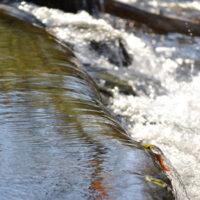Why Stormwater Runoff is a Danger

Heavy rainfall during tropical storms and hurricanes is a serious problem, especially in urban environments like Daytona Beach. In isolated rural areas, water can seep into the soil, so flooding and runoff are far less significant. However, concrete and asphalt are impermeable structures, which prevents the water from going anywhere.
According to the United States Geological Survey (USGS), stormwater runoff is water that flows over ground after a storm. The key problem with runoff is that the water can pick up other chemicals as it flows over land and ultimately deposits them into the water ways. For example, heavy use of fertilizers containing nitrogen and phosphorus is common on agricultural lands, and these chemicals can be carried to rivers and other waterways.
Daytona Beach does not have agriculture. Nevertheless, stormwater runoff can pick up chemicals used in people’s own yards or on the sides of the roads, carrying them to water sources. The quality of our water can degrade as a result.
Dangerous Substances in Runoff
Stormwater runoff can pick up all kinds of pollutants, such as:
- Metals from roofs and roads
- Petroleum products, such as oil or gas that leaks from motor vehicles
- Nutrients from lawn fertilizers
- Bacteria contained in human and animal waste
Although a little bit of these pollutants might not make much of a difference in water quality, hurricanes and tropical storms can create a significant amount of runoff. The more running water there is, the more pollutants that can be picked up and transported.
Another problem is sediment. As maps at the USGS website make clear, significant storms move lots of sediment, which can literally rebuild the Florida coastline. Excess sediment can have both beneficial and negative effects on ocean water.
How You Can Help
If you are a property owner, then you can help prevent pollutants from entering the water system by making sure that they are properly stored. For example, if you have gasoline, fertilizer, or metals, you should store them safely above ground. Don’t leave fertilizer on the bottom of a shed, for example, where runoff can reach them. Instead, build a higher shelf and store them there. That way, they will stay high and dry during even a heavy storm.
You can also store chemicals in airtight containers that are difficult to open. Flood waters might carry them away, but at least the contents won’t be dumped into the waterway.
You can also clean up around your yard year-round. Avoid using chemicals, like fertilizers, and make sure rodents and their droppings are cleared from the property. Also clean up after your own pets. While its true that dog droppings eventually are absorbed into nature, storm runoff could collect them as well, depositing them in the ocean.
We Are Here to Help with Hurricane Insurance Claims
Runoff is a threat to public safety, so we all must do our part. Rising flood waters can also directly damage people’s property, and this is where Bundza & Rodriguez, P.A. can be a big help. Our Daytona Beach hurricane insurance claims attorneys can help you navigate the homeowners insurance process. Please contact us today.
Resource:
usgs.gov/special-topic/water-science-school/science/runoff-surface-and-overland-water-runoff?qt-science_center_objects=0#qt-science_center_objects
https://www.daytonalawyers.com/hurricane-damage-renters-insurance/

